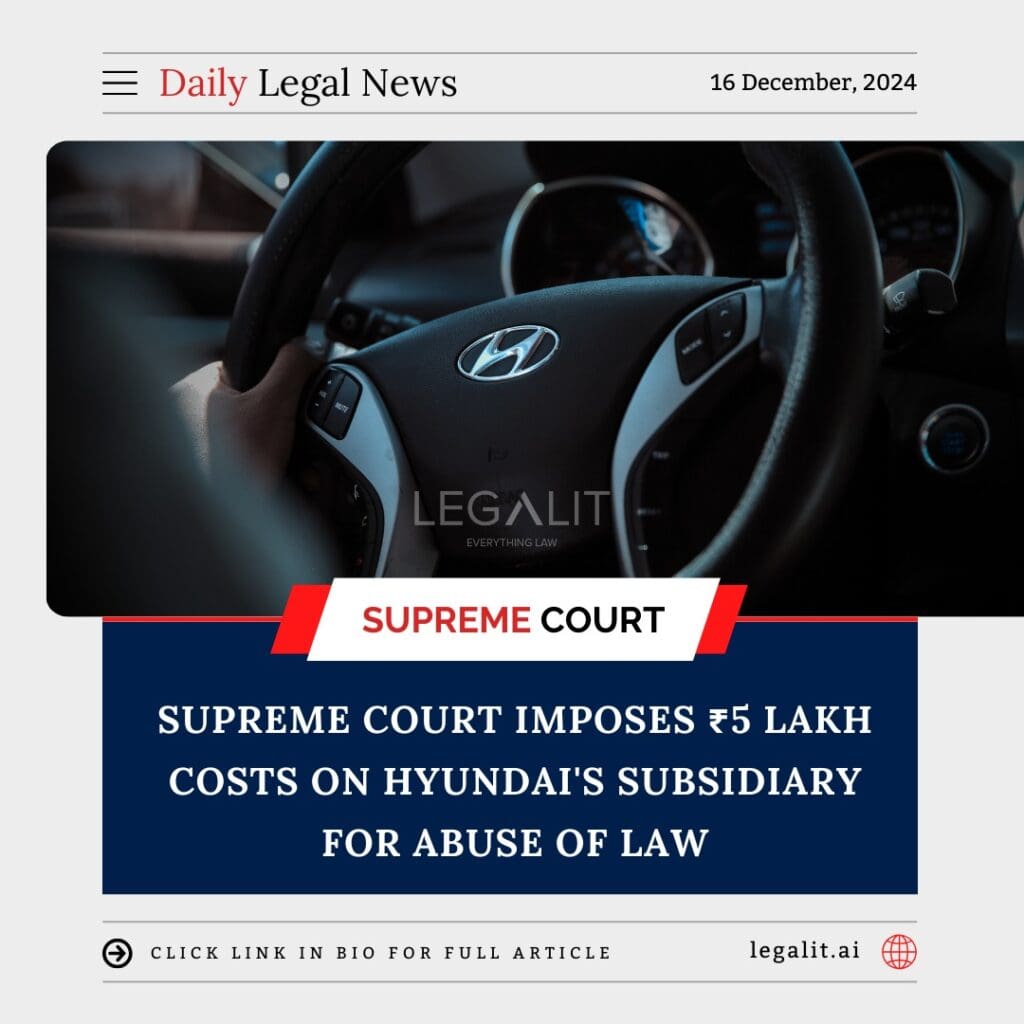
In a significant judgment, the Supreme Court of India recently imposed a cost of ₹5 lakh on a subsidiary of Hyundai for the abuse of law in a legal dispute. The court’s decision is seen as a strong stance against companies and entities that misuse the judicial system for improper purposes or engage in vexatious litigation.
Background:
The case involved a legal dispute where Hyundai’s subsidiary was found to have filed a series of frivolous and vexatious petitions, which were deemed to be an abuse of the legal process. The company had repeatedly approached the court in a manner that delayed proceedings and wasted judicial resources. The court had earlier given multiple opportunities for the subsidiary to resolve the issue amicably, but it continued with its aggressive and unjustified litigation tactics.
The case attracted the court’s attention due to the pattern of misuse of the legal system, which ultimately led to the imposition of costs. The subsidiary’s actions not only prolonged the dispute but also burdened the court system with unnecessary cases that could have been resolved through alternative means, such as arbitration or mediation.
Court’s Rationale:
In its ruling, the Supreme Court emphasized the importance of using the legal system responsibly and cautioned against the misuse of litigation for harassing or delaying opponents. The court noted that the judicial process is not meant to be used as a tool for causing undue hardship or for unfair advantage in disputes.
The imposition of costs is seen as a deterrent against such practices, sending a strong message to both corporate entities and individuals about the consequences of abusing the legal process. The court highlighted that while every party has the right to seek judicial intervention, it is crucial that such intervention be in good faith and not for ulterior motives.
The ₹5 lakh cost was imposed to penalize the subsidiary for its unjustified approach to the case and to prevent further misuse of the legal system. The court stressed that those who waste judicial time through frivolous litigation must bear the financial consequences, which also serve as compensation for the inconvenience caused to other parties involved in the case.
Existing Measures:
The Supreme Court has been actively discouraging the misuse of the judicial process by imposing penalties and costs in cases where it finds the actions of the parties to be frivolous or in bad faith. In recent years, the court has taken a more stringent approach to curb vexatious litigation, particularly in cases where corporations and large entities use their resources to engage in tactics aimed at intimidating smaller parties or stalling legal proceedings.
The imposition of costs is part of a broader effort by the judiciary to ensure that the court system is not overburdened with unjustified cases, thus maintaining the integrity and efficiency of the legal process.
Conclusion:
The Supreme Court’s decision to impose ₹5 lakh in costs on Hyundai’s subsidiary serves as a reminder to all parties involved in legal disputes to approach the judicial system with sincerity and responsibility. By penalizing the abuse of the law, the court not only holds corporate entities accountable but also reinforces the need for a fair and efficient legal process. The ruling underscores the judiciary’s commitment to ensuring that the legal system is not misused for tactical advantage and that justice is served in a timely and equitable manner.